Memoirs & Diaries - First Days of Imprisonment
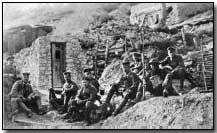 It was at a time when in
England the blackthorn begins to break into beauty, when fairies flit over
the hedges, leaving traces of gleaming whiteness; it was at a time when the
pale-scented cowslip shows the joy of life... It was the first day of
spring.
It was at a time when in
England the blackthorn begins to break into beauty, when fairies flit over
the hedges, leaving traces of gleaming whiteness; it was at a time when the
pale-scented cowslip shows the joy of life... It was the first day of
spring.
The much-discussed possibility of a great enemy offensive had become a reality. Overnight we had been moved up to the supports on that sector of the line facing the little village of La Fontaine, south-east of Arras.
It had rained heavily during the night and the trenches were filled with water. Dawn broke with a dense mist, which did not lift until noon. The enemy barrage started in earnest between two and three in the morning and continued with hardly a moment's lull for many hours.
Mixed with the deluge of shrapnel and high explosive were irregular spasms of gas shells. The barrages were mostly of the creeping variety, returning again and again in deadly waves.
Although the enemy had surrounded us early in the day, it was not until the evening that we had any inkling of our real position. We discovered then that we were being enfiladed from behind by machine guns, as well as from above by enemy planes.
Acting as a regimental stretcher bearer - the only one alive with what was left of our company - my work was not very easy, especially as a gas mask had to be worn most of the time. The mud and water were above our knees, and so many dead and dying lay around me that I was bewildered.
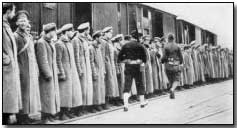 Without
boasting, I can say that I led a charmed life. I would attend to an
urgent case at a machine-gun post and deal with it just before the post was
blown up... and from that post to another and so on.
Without
boasting, I can say that I led a charmed life. I would attend to an
urgent case at a machine-gun post and deal with it just before the post was
blown up... and from that post to another and so on.
Being a big fellow, I carried some of the smaller ones on my back to a dug-out.
The dugout soon got full up... and I got so exhausted that I carried on in a mechanical sort of way. In the end my headquarters was a narrow bit of trench containing the captain of my company, my platoon officer, a sergeant, another private and myself. We seemed to be the only people left capable of standing up.
I remember my captain saying, "Stay here, we shall need you soon". It was not long before he partly collapsed against the parapet with a good sniff of gas. I broke half a dozen of those small anti-gas containers under his nose and in his mouth, which brought him round.
Friends credit me with iron nerves, but by this time I was nearing the end of my tether. I moved like one in a trance. My stock of field and shell dressings had long since given out and I was tearing up puttees, shirts, socks, anything that would make a bandage.
I was hungry, worn out, wet through to the skin, and covered in mud and blood. I had had nothing to eat since tea-time the day before. The few biscuits I did have I gave to my platoon officer in exchange for his last cigarette and a drop of rum. A few minutes after, he was dead with a lump of shrapnel in his brain.
At the moment of my capture, I was working on a fellow with his ribs smashed, kneeling down and bending over him, trying to stem the rush of blood. I happened to glance up, looking for someone who could assist me, when I found the fair face of a Saxon looking down intently at me.
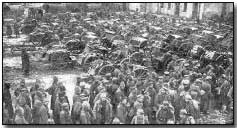 Preoccupied
with my work, I had not noticed him before. With his rifle slung
across his back, he pushed a long-nosed field revolver almost down my
throat. His sudden appearance completely surprised me. Glancing
round quickly, I found myself surrounded. The trench and parapets
swarmed with German infantrymen.
Preoccupied
with my work, I had not noticed him before. With his rifle slung
across his back, he pushed a long-nosed field revolver almost down my
throat. His sudden appearance completely surprised me. Glancing
round quickly, I found myself surrounded. The trench and parapets
swarmed with German infantrymen.
I got up slowly from my kneeling position, the revolver still pointing at me, and put up my hands. My captor stripped my pockets, but gave me back some photographs and, smiling, pointed up the trench. Moving up it was a string of wounded, guarded by the enemy.
I followed them. We threaded our way across No Man's Land in batches of about six, two or three guards watching each group. The artillery reply to the enemy's fire was not very heavy and it fell short, else some of us might have been spared the journey across.
We had been deprived of our gas masks, hence it was no joke trying to avoid the gas-infected areas. In and out of the smashed wires, shell-holes, and dead we filed, the guards stopping now and again to examine the bodies of the dead. Some of us had to pick up German wounded.
A series of long marches from station to station followed, until finally we arrived at a field hospital. This was a three-walled store tent, open to the inclemency of the weather. Inside, the dead and dying were heaped one upon another, the dying shivering with cold. We thought to find food here, but none was forthcoming.
It was quite dark by now, and the inside of the tent could be seen only when a shell burst near enough to light up the interior with its flashes. Walking through the wires with a mud-soaked greatcoat was well-nigh an impossibility, so I had discarded it. At nightfall, however, it got very cold and I began to shiver. Seeing a dead man at my feet wrapped up in a cloak, I quietly robbed him.
After standing about for a while, we filed off again. The guards leading us were in a hurry. They rushed away, but I was too tired to hurry and keep pace with them. I had a slight surface wound on my right heel. I could not help lagging behind until at last I was alone, lost in the dark.
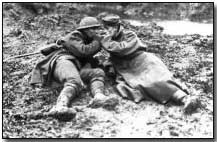 Early
the next morning some German transport men found me wandering about and took
me to an officer. He sent me to a barbed-wire enclosure.
Early
the next morning some German transport men found me wandering about and took
me to an officer. He sent me to a barbed-wire enclosure.
In this cage I found many others, perhaps about 500 prisoners. We stopped there, exposed to the weather, all that day and the following night, and with nothing whatever to eat or drink. Here we were searched by an interpreter who tried to frighten us. He warned us we should be shot at sight if we attempted to escape.
We were not to communicate with the inhabitants of the occupied area, or to receive food from them.
Next morning a weary crowd stumbled out of the cage headed by two Uhlans mounted with all their gorgeous martial trappings. This display made the procession dramatic and spectacular. The night had been cold and had left a heavy dew on the grass.
In the morning the sun rose, and its warmth put more heart into me and a little more strength into my legs. As we passed through the billets of soldiers, resting or waiting to be moved up in an emergency, they came out in crowds and lined the route.
Some ran from great distances to see us. They eyed us with stolid, unemotional faces. Their minds seemed to have been ground down to a soulless state by their circumstances. Once we passed a transport-driver who had half a black loaf in his hand - that is to say, a piece of coarse bread measuring about 5 inches by 4 inches by 4 inches.
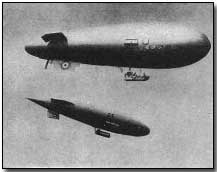 He
offered it to a fellow prisoner in front of me in exchange for a leather
jerkin. The exchange made, the prisoner tore the bread into pieces and
gulped it down. Such an incident cannot easily be forgotten; it is
stamped into the memory.
He
offered it to a fellow prisoner in front of me in exchange for a leather
jerkin. The exchange made, the prisoner tore the bread into pieces and
gulped it down. Such an incident cannot easily be forgotten; it is
stamped into the memory.
A week of tramping about behind the lines followed. We moved like a herd of cattle about to be slaughtered, from one barbed-wire cage to another. Sometimes we were nearly bombed by our own airmen. We seemed to be on exhibition, and forced to march in fours and keep in step.
In our weak condition, marching was a necessary agony, but to keep in step was more; it was an imposition. To suffer under restraint is deadly. It is like chaining a man to the scaffold on which he is to be hanged. The clothes I stood in and my tin helmet were all I possessed.
Day by day, I became weaker until at last it got difficult for me to walk any distance. My feet began to blister; my socks were dirty and began to rot. In time the blisters became open sores and my socks fell off my feet. My slight wound complicated matters.
I just dragged myself from place to place. The guards paid no attention to my painful state. They just pushed me along or hit me with the butt-end of their rifles when my legs began to give way or the pain of walking became too great.
There were many other prisoners like me. Sometimes, even my "tin-hat" became heavy and sat on me like that great burden which Bunyan's famous Pilgrim carried in his illustrious Progress. I did not throw it away, however, because it was the only kind of hat I possessed. I thought it might become useful later on.
About the end of March we reached Marchiennes. Here, I first tasted sauerkraut. We were supposed to line up for this, but the fellows were in such a state that the sight and smell of anything like food sent them mad. The first taste made me sick. With this delicacy we were given a morsel of bread about three inches cubic once a day.
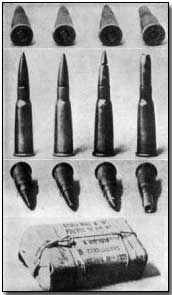 Unfortunately,
our prison was placed next to a field bakehouse. Hour after hour,
fascinated, we would watch groups of Russian prisoners stack hundreds of
freshly-baked loaves on wagons to be sent away. In our eagerness to
smell the bread, our faces were pressed right up to the barbed wire.
Unfortunately,
our prison was placed next to a field bakehouse. Hour after hour,
fascinated, we would watch groups of Russian prisoners stack hundreds of
freshly-baked loaves on wagons to be sent away. In our eagerness to
smell the bread, our faces were pressed right up to the barbed wire.
It was a horrible torture to which we helplessly submitted ourselves. The temptation was irresistible. In this case pain itself became a pleasure. Every few minutes, a guard came along and slashed with his bayonet to keep us away from the wires.
French children native to the place watched the guard, and when the way was clear, approached the wire and threw in pieces of bread, lumps of swede, sugar-beet, and carrot. These were given to us at first out of merciful good nature, but some of the prisoners, eager to get more, began to barter with anything of value that they were still fortunate enough to possess, such as money, gold rings, and boots.
The original good intentions of the children were corrupted and the only extra source of life then available cut off from all but a very small minority. In course of time even this minority undercut itself, because in the circumstances the most opulent of prisoners could not go on producing money or gold rings or whatever was necessary to carry on their self-inflated and self-imposed system of trafficking.
When one of these fellows got a little bit of food, he gulped it down before his comrades had had time to snatch at it. My chief amusement consisted in watching the children playing about and in wondering when I should have the joy of being free again. Every act of their freedom was followed with hungry, envious eyes.
There were a few hundreds of us at this camp at Marchiennes. It was a cheerless place... designed to break the best of hearts.
We had to sleep on a stone floor. If a small quantity of straw could be got, and what is more important, kept, the coldness of this floor could be modified. Straw could only be kept by sitting on it; as soon as your back was turned, it was taken by your neighbouring bedmates.
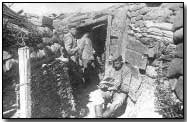 At
night, if the air was very cold, we lay and froze until, becoming numbed, we
were forced to get up and walk about the yard for an hour or so to try and
keep warm. It can be imagined how utterly miserable I felt.
At
night, if the air was very cold, we lay and froze until, becoming numbed, we
were forced to get up and walk about the yard for an hour or so to try and
keep warm. It can be imagined how utterly miserable I felt.
I had to squeeze between rows of other sleepers. It was always a tight fit. We were compelled to preserve the same position all through the night, unless, as I have already stated, we were forced to move for sheer lack of warmth. Then you were fortunate, indeed, if the bed place could be found upon returning.
Lice, also, began to appear and became a continual source of irritation. They remained from this time onwards my constant and faithful companions until my release. Water for washing purposes was unobtainable. We had no blankets.
Now and again, small parties were made up and sent away. They never came back. Some said they had gone to Germany. It was discovered a long time afterwards that they had been sent to work behind the German lines in the occupied areas of France and Belgium.
The wheels of time turned slowly but surely and the hour came at last when I found myself in an outgoing party. I hoped it was going to be my fortune to find better conditions. I expected to say good-bye to the cold, lice, and starvation, Marchiennes once left behind.
During the following march it poured with rain and, my feet still being bad, I staggered along all day in the mud.
It was evening when we arrived at Douai. We were shut up here in a cold, very dark, dirty dungeon of a brick-kiln. As far as billets were concerned, we had gone from bad to worse. The food was a little better. We only had sauerkraut at odd times.
The same amount of bread was given, but the monotony of the diet was relieved by a meal of horse-beans and sometimes a small piece of black sausage about an inch cube or a teaspoonful of turnip-saccharine jam.
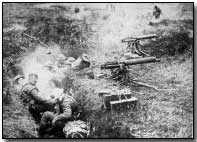 All
these came under the heading of dinner. Breakfast, served to us
between 4 and 5 in the morning, consisted of a drop of some liquid,
invariably hot, and seriously called coffee by the guards. It was
compounded of a roasted mixture of acorns, sugar-beet, and other vegetable
substances.
All
these came under the heading of dinner. Breakfast, served to us
between 4 and 5 in the morning, consisted of a drop of some liquid,
invariably hot, and seriously called coffee by the guards. It was
compounded of a roasted mixture of acorns, sugar-beet, and other vegetable
substances.
We were made to work, and were sent out in large working parties. After breakfast, we set out before it was light, and seemed to walk miles through deserted and shell-smashed villages. Although these villages had the appearance of being deserted, they were actually alive with German infantrymen, who lived underground.
Our work consisted of remaking the railroad along which was once the main French line from Douai to Arras. Some days we "packed" under the sleepers with heavy hammering tools or helped to straighten the lines with great iron crowbars.
Other days, we laid down the rails ourselves and fixed them. Sometimes we had to carry on under fire from our own guns.
It was heavy and heart-breaking work on the little food we were given. The tramp to the neighbourhood of our work was in itself a task. Work was begun as soon as we arrived and continued until about 2 or 3 in the afternoon. There was no fixed hour for ceasing work. We were forced to wait until relieved by a mixed party of German and Austrian labour parties.
When relieved we tramped home, it being generally dark when we arrived at our brick-kiln abode. Then we had our dinner. Dinner! let those two syllables sink in. Dinner! all the whole day between 5 in the morning and 5 in the evening, we had nothing whatever to eat.
It was curious to tramp along the old French line, past the broken-down stations, with all their glittering grandeur of glass smashed to dust. We sometimes came across some old wayside sign still hanging, a forlorn and tragic indication of the civilization that was once.
I often wondered how many pretty damsels in neat dresses, or dapper, bearded, well-groomed gentlemen had waited for the train on those refuse-covered, grass-grown platforms.
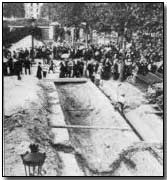 The
attitude of my mind during those unusual days reviewed in the light of
to-day excites my wonder. Forcing myself to smile, I never gave up
hope.
The
attitude of my mind during those unusual days reviewed in the light of
to-day excites my wonder. Forcing myself to smile, I never gave up
hope.
Some fellows lost heart from the first. Their spirits gradually sank, their bodies with them until to live became too great a burden. They just passed away.
From this time on to the Armistice is a bitter story of months of the agony of demoralising starvation, of sickness, of ever-present death, of escapes and recaptures, of hard work, of the great retreat, of the stupefaction of sudden freedom - a bitter story with one or two bright moments.
Private Reginald Morris joined the Artists' Rifles in June 1915, at the age of 19, but was recalled to the Civil Service, enlisting again in January 1916. In June 1916 he was in France with R.A. Ordnance Corps, having a hectic few months dodging explosions on bombed and shelled ammunition dumps.
In April 1917 he was transferred to Infantry Training Corps, joining the 25th Northumberland Fusiliers in May 1917. He served at Ypres, Cambrai, and Scarpe Salient, and various points on the Arras front. In March 1918 he was captured opposite La Fontaine.
First published in Everyman at War (1930), edited by C. B. Purdom.
Photographs courtesy of Photos of the Great War website.
"Suicide Ditch" was a term used by British soldiers to refer to the front-line trench.
- Did you know?
